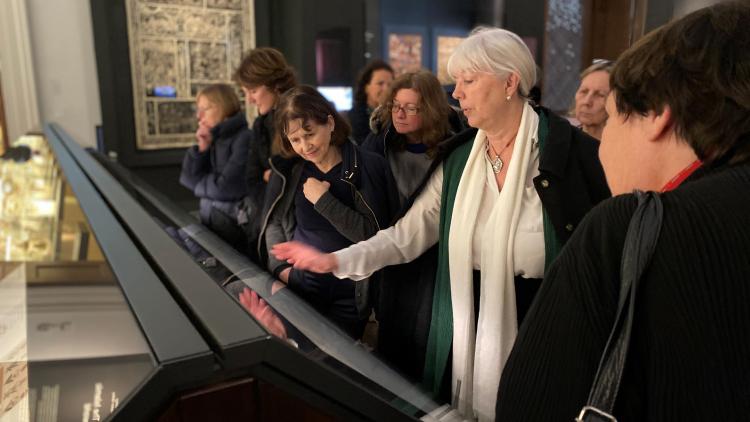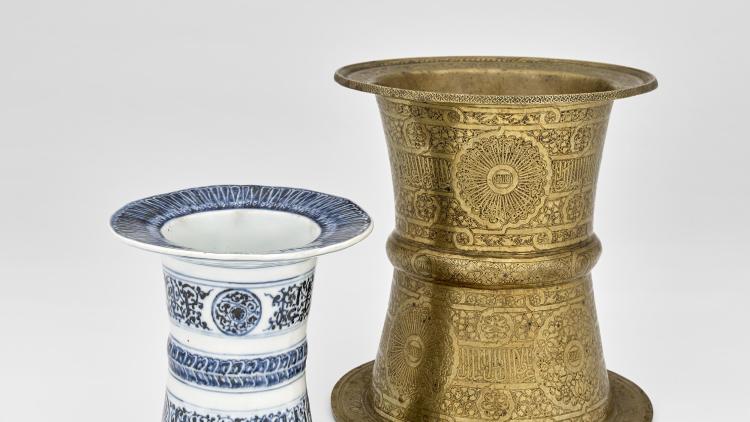BA Creative Arts and Cultural Industries


Key information
- Duration
- 3 or 4 years
- Start of programme
- September
- Attendance mode
- Full-time
- Location
- On Campus
- Fees
-
Home: £9,535
International: £23,780 - Course code
- Y001
- Entry requirements
-
A levels: BBB
Contextualised offer: BBC
See undergraduate entry requirements and English language requirements for international and alternative entry requirements.
Course overview
On the BA Creative Arts and Cultural Industries, you will study Asia, Africa and their diasporas through a range of disciplines, from History of Art and Archaeology to Music, Curating, Film and Media.
The only programme of its kind in the UK, the degree offers historical, theoretical and practical training by world-leading experts, and supported by close connections with industry partners. Strong emphasis is placed on professional skills tailored for industry demands, and ideally suited for careers in arts management, marketing and public relations, journalism, and the music industry.
Students can shape their degree around specific regional or thematic interests through wide-ranging options from across the School of Arts and other departments at SOAS. The first year gives students an introduction to the arts, music and cultural industries of Asia, Africa and the Middle East. During the second and third years, students continue developing critical theory and research skills.
Optional modules can include a language or other discipline outside the School of Arts, and practice-based modules which offer training in skills such as musical performance, podcasting, sound recording and curating.
Why Study Creative Arts and Cultural Industries at SOAS?
- SOAS is ranked top 30 in the UK for Arts and Humanities (QS World University Rankings 2025)
- SOAS Music ranked best in the UK for research impact and 5th overall in the Research Excellence Framework (REF) 2021
Year in Industry
This programme offers a professional placement opportunity designed to improve your employability and put you in a better place for life after university. A professional placement is a great first step to getting necessary work experience and securing the career you want.
During your third year, you will work with a business or organisation and apply the knowledge you've learnt on your course in the workplace. You’ll develop skills like planning, problem-solving, decision making and project management, while getting first-hand experience on how a professional organisation works.
*Placement opportunities are organised by the student. If a placement is not found, you will be transferred onto the standard 3-year programme of study.
Study Abroad
Students are able to apply for the optional year abroad in their second year of studies at SOAS. Students will be invited to information sessions about how to apply during their second year of studies by the Study Abroad team. Student applications are considered on academic merit and a personal statement and are subject to availability. Students need to have achieved 55% or higher in their first year of studies to be eligible. For further details, visit the Study Abroad section of our website.
Structure
Occasionally the availability of optional modules changes as a result of staffing and other circumstances. Students who had signed up for such modules will be notified as soon as possible and given the opportunity to choose from available alternatives.
Important notice
The information on the website reflects the intended programme structure against the given academic session. The modules are indicative options of the content students can expect and are/have been previously taught as part of these programmes.
However, this information is published a long time in advance of enrolment and module content and availability is subject to change.
Year 1 - Compulsory
Year 1 - Guided options
Up to 30 credits from guided options or language
Year 2 - Compulsory
Year 2 - Guided options - List A
30-60 credits from List A
Year 3 - Compulsory
Year 3 - Guided options - List B
45-75 credits from List B
Teaching and learning
Taught across the departments of the School of Arts, the BA Creative Arts provides a unique opportunity to learn about current debates in global arts, combining ethnographic, art historical, film and literary-critical approaches.
The BA will provide a solid foundation for careers and postgraduate study in art history, music, English, film, global creative and cultural industries, curating, and museology.
Contact hours
All full-time undergraduate programmes consist of 120 credits per year, in modules of 30 or 15 credits. They are taught over 10 or 20 weeks. The programme structure shows which modules are compulsory and which optional.
As a rough guide, 1 credit equals approximately 10 hours of work. Most of this will be independent study. Also included are class time, which may include lectures, seminars and other classes. Some subjects may have more class time than others – a typical example of this are language acquisition modules.
In the School of Arts, most undergraduate modules have a 2-hour lecture or 1-hour lecture and 1-hour seminar or a 2-hour seminar every week. Some, but not all, also have a 1-hour tutorial every week.
More information can be found on individual module pages.
Learning outcomes
- Specialist knowledge of cross-cultural expressive arts of Asia, Africa or the Middle East and their diasporas.
- A critical awareness of world art/world cultures/world heritage, with an emphasis on SOAS’s regional specialisms (Asia, Africa and the Middle East).
- Ability to articulate, compare and critique debates surrounding art history, music, popular culture, film, media and/or literature as applied to transcultural contexts.
- Ability to define and undertake independent research on the expressive arts and cultural practices of Asia, Africa, the Middle East and/or their diasporas.
- Ability to analyse case studies of specific works of art, film, media or music.
- Development of individual and collaborative skills in, e.g., exhibitions, festivals, visual and literary analysis, cultural journalism, radio presentation, podcast production, sound recording, musical performance and cultural entrepreneurship.
- Ability to create a coherent verbal presentation, written report or portfolio, individually and as part of a group.
- Effective analytical and critical written skills.
- Improved written communication in academic and other formats and media developed via a range of assessments.
- Enhanced team working, organizational, project and time management skills developed particularly during the preparation of group projects and assignments in the practice-based modules.
SOAS Library
SOAS Library is one of the world's most important academic libraries for the study of Africa, Asia and the Middle East, attracting scholars from all over the world. The Library houses over 1.2 million volumes, together with significant archival holdings, special collections and a growing network of electronic resources.
Fees and funding
Fees for 2026/27 entrants per academic year
| Programme | Full-time | |
|---|---|---|
| Home students | Overseas students | |
| BA, BSc, LLB | £9,535 | £23,780 |
| BA/BSc Language year abroad | £1,425 | £11,770 |
See undergraduate fees for full details.
Employment
Students in the School of Arts develop a critical and theoretically informed approach to global arts and culture. In addition to an intercultural awareness and practical expertise, graduates gain a wide portfolio of transferable skills which are especially sought after in the creative and cultural industries.
Find out about our Careers Service.












